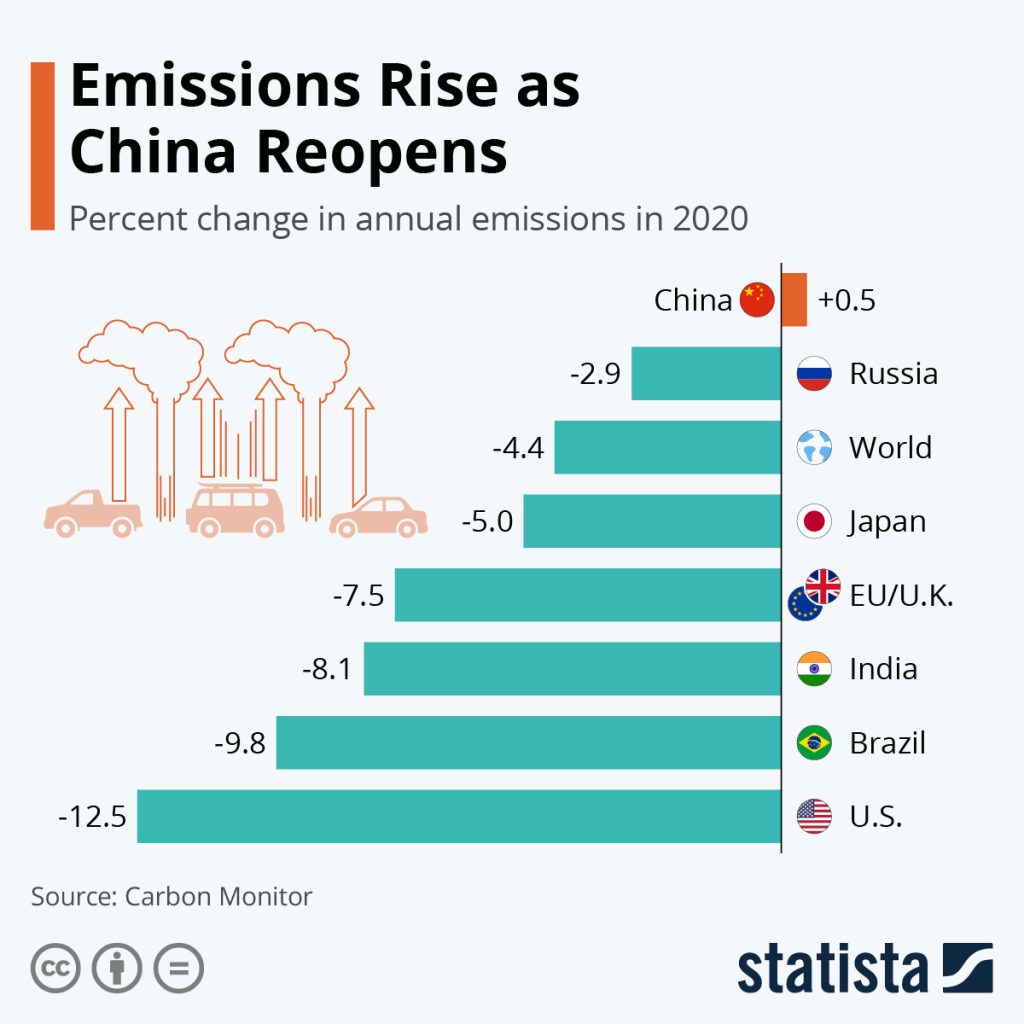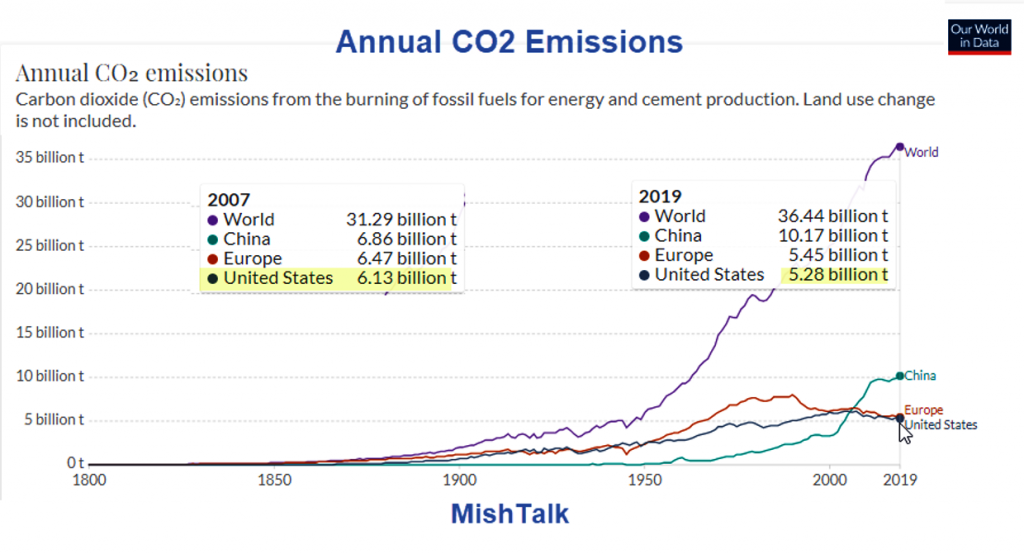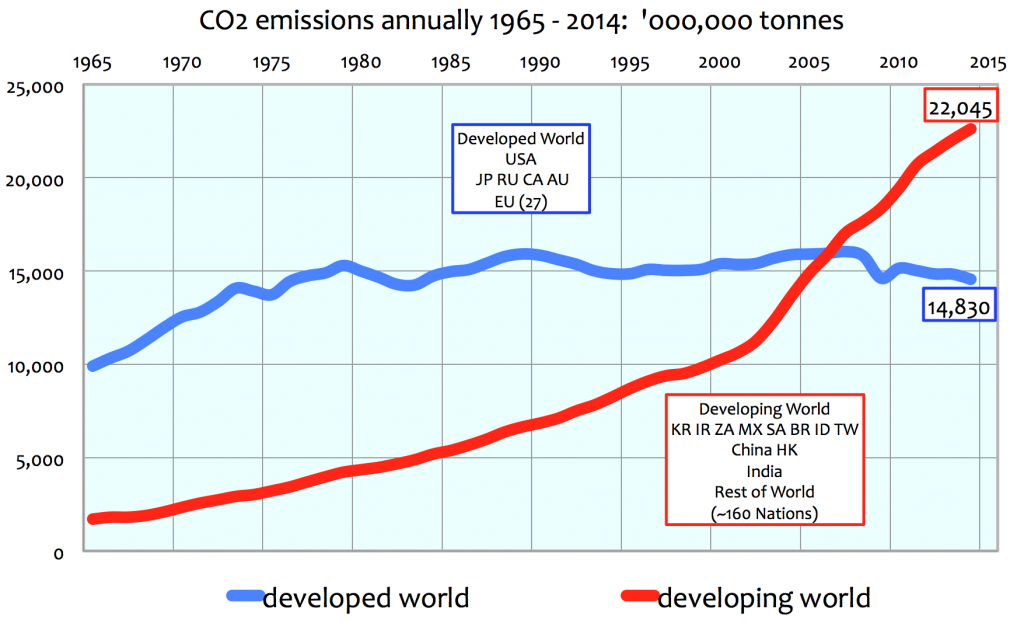Taps Coogan – February 6th, 2021
Enjoy The Sounding Line? Click here to subscribe for free.
Enjoy The Sounding Line? Click here to subscribe.
Here is some good news. Global carbon emissions fell by roughly 4.4% in 2020 according to data from Statista. A drop in global emissions in 2020 was something that was unthinkable just a year ago. It happened largely because of the global recession, but it’s a silver lining in an otherwise gloomy year.
Emissions fell in virtually every region of the world except China. China has free rein to increase emissions as much as it wants for another decade under the Paris Climate accord and is on a coal power plant building spree, adding the equivalent of a new coal plant every single week in 2020. Emissions in the US are estimated to have plunged 12.5%. Emissions in India fell 8.1% and emissions in the EU & UK fell 7.5%.

Here is some more good news. US and European carbon emissions have been falling steadily for years, decreasing by nearly 14% and 16% respectively from 2007 through 2019. US carbon emissions fell at roughly the same pace during the Trump Administration as the Obama Administration and have kept pace with Europe despite more market-oriented policies and much lower energy prices. That’s another good thing.

There is even more good news. Emissions from the entire developed world have been declining for 15 years and are lower than they were in the late 1970s. The entire trend of increasing global emissions going back to the early 2000s is a result of emerging markets and primarily China. As mentioned above, China is on an accelerating coal power plant building spree.

Despite the endless pseudo-scientific apocalypse mongering, the developed world has already figured out how to reduce emissions and has been doing it for nearly two decades.
The biggest single factor that has led to declines in US emissions has been swapping coal for natural gas. Renewables, nuclear, and better energy efficiency have been significant contributors as well but focusing on those technologies to the exclusion of natural gas would have yielded worse results.
Renewable power sources are intermittent and must be backed up by base load power. Basic analysis reveals that meaningful grid scale energy storage is still tens of trillion of dollars and decades away from reality. If increasing US natural gas production and generation had not occurred along with renewable adoption, that backup demand would have been met by coal. Despite logically flawed claims to the contrary, natural gas really is much cleaner than coal.
For most emerging markets, which need to increase energy availability today or languish in poverty, the choice for backup power is between coal and natural gas. Regardless of how quickly they build wind, solar, and batteries, they are going to need to build dramatically more coal or natural gas plants. They need to increase on-demand power capacity, not just reprioritize existing on-demand capacity to accommodate renewables when the wind is not blowing or the sun is not shining. The limited availability and higher price of natural gas is why emerging markets continue to build coal power plants.
Climate policy that increases natural gas prices and decreases its availability by blocking drilling and pipeline construction in the US will directly undermine the most effective tool that the US has to reduce global emissions.
Choosing a moment in time when emissions are falling across the entire world, when emissions in the developed world have been falling for 15+ years, and when the US is in the midst of the worst jobs recession in generations, to prioritize misguided climate pseudoscience that kills jobs and infrastructure is the height of folly.
Would you like to be notified when we publish a new article on The Sounding Line? Click here to subscribe for free. The Sounding Line is now ad free and 100% reader supported. Thank you to everyone who has donated.
Would you like to be notified when we publish a new article on The Sounding Line? Click here to subscribe for free.


Taps, To start off, I am thrilled that you wrote about carbon emissions. It is, in many ways, the measure of the decade. That said, the points you make about carbon emissions falling in industrialized countries is misleading, and your conjecture that, “developed world has already figured out how to reduce emissions and has been doing it for nearly two decades,” is, objectively, false. First, emissions fell by more than 4.4%, closer to 7%. as per NASA (https://www.carboncyclescience.us/2020-Global-Carbon-Budget), and another dataset on Statista (https://www.statista.com/statistics/264699/worldwide-co2-emissions/). The following is perhaps the most reliable source for global emission data: https://essd.copernicus.org/articles/12/3269/2020/. Secondly, while… Read more »
Thanks for the great comment. Much appreciated. Very interesting and well thought out. Your first point: Pick whatever number you want. The point is they went down. Second point: Allocating emissions by both production and consumption is, by definition, double counting. If you want to know where emissions are rising, look at production. If you want to know why, look at many things. That includes consumption, but it is not limited to that. For example: Absolutely correct that emissions are rising in places like China partly because western companies outsourced production to China because of the non-sensical economic, permiting, and… Read more »